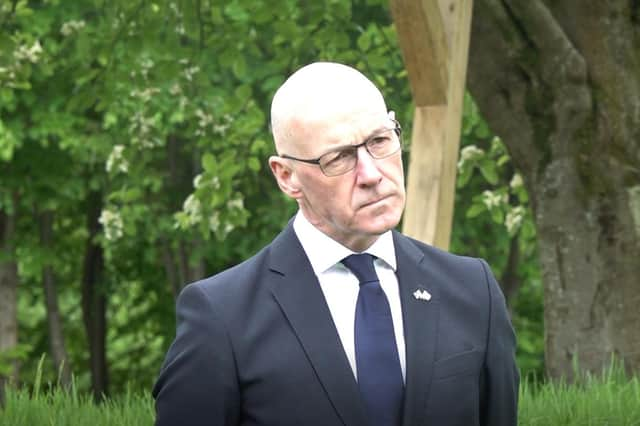Scottish Budget: Temporary tax hikes of three to five per cent for most people are necessary to stop faltering public services damaging economy – John McLaren


NHS waiting lists are rising rather than falling. Legal backlogs persist. School inequalities remain heightened. Lengthy delays for asylum seekers and social security claimants. Growing job vacancies in the NHS and the social care system. Not to mention a variety of logjams over driving licenses, passports, etc.
The reality is that we have tried to move forward from Covid without coming to terms with its longer term implications for public service spending levels. The fact that the pandemic arrived on the back of a decade of relatively low budget settlements for the NHS and cuts for many other services has meant that a premature return to ‘normality’ is particularly ill advised.
Advertisement
Hide AdAdvertisement
Hide AdTwo things are needed. First, debilitating backlogs in the NHS, courts and schools must be tackled. Second, there should be an investment push to improve the resilience of these sectors, in case another pandemic arrives, and to help reverse the impact of years of public sector under-investment in general.
There is a third issue that has further complicated matters: the surge in inflation and resultant cost-of-living crisis. This has led to a rising differential in pay growth, with latest figures from the Office for National Statistics showing annual pay rises of 6.9 per cent for the private sector but only 2.7 per cent for the public sector.
While some divergence over time might be acceptable, the degree to which public sector settlements are becoming detached from those in the private sector is starting to look both unfair and untenable. The Scottish Government has, somewhat grudgingly, come to accept this point, but the UK Government remains in denial.
It should prove easier to negotiate some form of pay moderation if, at the same time, public sector workers can see that heightened investment is improving their future working conditions. The current UK Government’s wider ideological stance, and avoidance of a big tax-funded boost last month, suggests that now might be the right time for the Scottish Government to strike out on its own path, rather than just make minor tax variations around the edges.
Some, notably the STUC, have proposed higher taxes via permanent changes focussed on the most well-off. Looking at the issue from a post-Covid budget perspective, I would suggest a different approach. This involves increasing the rate of income tax across all but the lowest band by between three and five pence in the pound for the next four years.
Scottish Government analysis of tax changes suggests that this would provide an extra £1.3 billion to £2.1bn a year and a cumulative total of around £5bn to £8bn. That is a wide range but it allows for different political parties to appraise what they believe voters will find acceptable.
This transitional, Covid-related money would be available to fund investments that strengthen frontline public services, making them a less stressful place to work and turning them into environments that are stable, with room to absorb shocks, rather than permanently teetering on the edge of chaos or regularly working over capacity. After such a ‘correction’, decisions over permanent tax rates can be made while reflecting back on which of the extra spending streams might be worth retaining and which have accomplished their task, thereby allowing taxes to return to a lower level.
The above approach spreads the costs across most households for two reasons. First, it is an investment boost that aims to improve public services for the benefit of all citizens. Second, the big money comes from raising the tax rate at basic and intermediate rates. Concentrating only on the higher and top level rates much diminishes the extra tax revenue available.
Advertisement
Hide AdAdvertisement
Hide AdIdeally, revisions to council tax and the introduction of a wealth tax would be under consideration too. However, the first remains the ‘third rail’ of Scottish politics, seemingly untouchable in practice, while the second would require years of preparation and would likely suffer from the same distributional concerns that have dogged council tax reform.
Any such announcement would be a big picture statement of intent. It would need to be followed up by analysis of what is possible given current staff shortages, as well as a rethink on what level of public sector employment is desirable. At present, the Scottish Government’s declared intention of a frozen public sector wage bill, implying reduced staffing numbers, seems untenable.
Other areas might also be considered for investment boosts. In terms of helping with energy costs and moving to net-zero emissions, there could be an extensive, one-off, housing insulation programme, as recently recommended by the Resolution Foundation, and in terms of improving economic prospects and addressing cost-of-living concerns, a permanent increase in the subsidy of childcare, as espoused by the Organisation for Economic Co-operation and Development and the Institute for Public Policy Research.
There will be plenty of ideas for improvement. The test, in terms of how willing the electorate are to keep paying for them in the long term, will be how efficiently and effectively they are implemented.
Because of global issues we are all now poorer, so raising taxes is not an easy or popular option. However, the alternative is to continue to struggle on with few public services providing a satisfactory service and with negative knock-on impacts on productivity. The danger is of the establishment of an adverse feedback loop between poor public services and the economy.
The status quo is broken, a new balance needs to be arrived at. This will almost certainly require higher taxes. How much higher is up for debate, as too is where that money goes, but the need for radical change should not be.
John McLaren is a political economist who has worked in the Treasury, the Scottish Office and for several economic think tanks
Comments
Want to join the conversation? Please or to comment on this article.